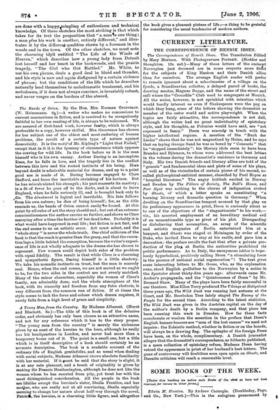C URRENT LITERAT URE.
THE CORRESPONDENCE OF HENRIK IBSEN.
The Correspondence of Henrik Ibsen. The Translation Edited by Mary Morison. With Photogravure Portrait. (Hodder and Stoughton. 12s. net.)—Many of these letters of the eminent Norwegian just deceased are in some respects more fitttd for the subjects of King Haakon and their Danish allies than for ourselves. The average English reader will prefer to remain ignorant about a schoolmaster of a village on the fjords, a Scandinavian solicitor, a delayed parcel of books, the drawing master, Magnus Bagge, and the name of the street and can where the "Crocodile" Club used to congregate at Munich. All the series, however, is not sprinkled with minutiae which' would hardly interest us even if Shakespeare were the peg on which they hang, some of the letters showing the dramatist as member of the outer world and active playwright. When the topics are fairly attractive, the correspondence is not dull, although the writer had no great individuality of epistolary style, and his thoughts, as Polonius would have said, are "not expressed in fancy." Ibsen was scarcely in touch with the higher intellectual regions. A mention of the "Bach der Lieder" shows that he was not magnetised by Heine, and he says that on trying George Sand he was so bored by " Consuelo " that he "stopped immediately": his literary idols seem to have been Brandes and Bjornson, to whom were addressed the best letters in the volume during the dramatist's residence in Germany and Italy. His two Danish friends and literary allies are told of the "genesis" and fundamental ideas and plots of some of his plays, as well as of the vicissitudes of certain pieces of his second, so- called philosophical-satirical manner, classified by Paul Heyse as "hospital literature." The angry hubbub excited in Norway and Sweden by The Pillars of Society, The Doll's House, and Peer Gynt was nothing to the chorus of indignation evoked by Ghosts, of which a letter speaks as constituting "a burning literary and dramatic question in Germany." When dwelling on the Scandinavian tempest aroused by that play on its preliminary appearance in print, Ibsen is curiously silent as to one of the objections of the " stagnationists" to his work,— viz., his asserted employment of an hereditary medical evil of an unmentionable type as pivot of his plot. Disregarding or disbelieving that assumption, an array of the scientific and artistic magnates of Berlin entertained him at a banquet, and Ghosts was staged at Meiningen by order of the Duke, who invited Ibsen to stay at his castle, and gave him a decoration: the preface recalls the fact that after a private pro- duction of the plea at Berlin the authorities prohibited its public performance. As to Italy, the anonymous editor is hope- lessly hyperbolical, positively calling Ibsen "a stimulating force in the process of national social regeneration " 1 The text gives some interesting letters to Mr. Gesso, who, as the explanation runs, stood English godfather to the Norwegian by a notice in the Spectator about thirty-five years ago: afterwards came Mr. Archer's propaganda, and the " Quintessence of Ibsen " by Mr. Bernard Shaw. Many of the plays have been fairly successful in our theatres. Miss Ellen Terry produced The Vikings at Heligoland three years ago, The Wild Duck was running last autumn at the Court, and Mr. Beerbohm Tree lately staged The Enemy of the People for the second time. According to the latest statistics, The Wild Duck was given in the Austrian capital on the day of the author's death by a Berlin company, and that piece has been running this week in Dresden. How far these facts corroborate or weaken the assertion in the preface that Ibsen's English banner-bearers are "men of the lost causes" we need not inquire : the Zolaistic method, whether in fiction or on the boards, will always be a drawing flag. The epitaphs of the foreign Press have been, on the whole, complimentary. A Danish journalist alleges that the dramatist's correspondence, as hitherto published, is a mere collection of epistolary refuse, Madame Ibsen having vetoed the appearance in print of her husband's best letters. The guns of controversy will doubtless soon open again on Ghosts, and Ibsenite criticism will reach a reasonable level.






































 Previous page
Previous page